Sarahbeth Caplin's Blog, page 37
February 23, 2016
When all you can do is manage
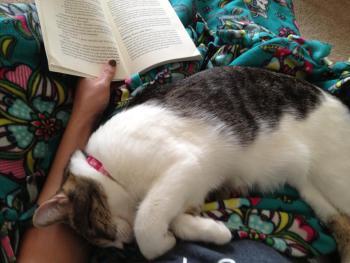 “Some things cannot be healed; they can only be carried.”
“Some things cannot be healed; they can only be carried.”
That quote from a blog post critiquing the old adage “God won’t give you more than you can handle” dug itself under my skin when I read it. If you think about it through a Christian lens, it fits rather well with the idea of “picking up your cross.” What defines a “cross”? A burden. A struggle. A condition that cannot be improved or dissolved, but must be coped with. It can look like taking care of a difficult relative, living with chronic illness, or making a hard choice that is the right choice.
For me, that “cross” is living with depression and anxiety. Someone once told me I’m calling Jesus a liar by saying I cannot be healed. Would anyone have the nerve to say that to a cancer patient who can’t be healed? The treatments look different, but for the cancer patient and the person with depression, there is little choice but to manage the symptoms and live optimistically, but also realistically. We often credit the cancer patient for “winning the battle” when the illness goes into remission. Those who learn to manage their depression deserve the same credit.
There are two major “crosses” I’m learning to manage: the loss of my father, which is so indescribably deep that it physically hurts, and the trauma left by abuse from my last boyfriend. But I had depression before that, so I don’t really need to cite those things as evidence for its existence. That’s just to explain why the depression has gotten worse, despite being medicated and going to therapy. All lives are difficult in their own way, but trauma for a person with depression is like kicking a dog that’s always been down.
There are days when just getting out of bed feels physically difficult, and when I do, it’s an accomplishment.
There are days when getting out of bed, showering, getting dressed, and leaving my apartment is cause for celebration. I remember texting my husband one day about accepting a colleague’s invitation for coffee. No exaggerating here: it was a pretty big deal for me to say yes, to actually show up and engage. I’d honestly have no problem staying in my apartment with my books and my two cats forever, except I’m told that community is a vital part of being healthy: spiritually and otherwise.
I’ve had to downsize my expectations for healing and celebrate the little accomplishments, but “little things” are no less significant. It’s also necessary to point to that “healing” is not always a lasting condition. You can’t let anyone tell you you’ve lost the race if you get close to the finish line but never actually reach it. Not when you’re running for yourself. The days I am successfully able to be present, with a cup of coffee in my hands and a cat on my lap, bring me closer to that line.
Managing depression and anxiety is not a weak substitute for complete healing. But small acts of self-care lead in that direction, which is the most important thing.
Filed under: Religion Tagged: cancer, Christian culture, Christianity, depression, grief








February 20, 2016
Why the hell are we not disturbed?
 We’ve all encountered them at some point: the evangelists who preach that “unsaved” people will be cast into a lake of fire after death, without so much as a blink. I’m not sure which disturbs me more: the lake of fire part, or the people who accept this teaching without any churning in their stomachs at all.
We’ve all encountered them at some point: the evangelists who preach that “unsaved” people will be cast into a lake of fire after death, without so much as a blink. I’m not sure which disturbs me more: the lake of fire part, or the people who accept this teaching without any churning in their stomachs at all.
I’m not saying the hell doctrine is wrong or incompatible with the character of a loving, merciful God, much as I would like to. The reality, I don’t know, and anyone who thinks they know is making that statement out of faith, not fact. But whether hell is real or “loving” is not what I want to talk about, so much as the kinds of people who accept it without a second thought. I think we’re supposed to be disturbed by this. I think we are supposed to be disturbed enough to make a call to action.
For some people, that call to action is to evangelize more. For me, that call to action is to study. I’ve collected so many books about the afterlife lately: Christian and Jewish books alike, and I wish I could say I am closer to reaching some kind of verdict, but I’m not. I have theories, and while I can support these theories with Scripture (hopefully without any misuse of context) I can’t prove them. No one can prove that which can’t be seen in this realm of existence.
Until then, I wish more Christians would let themselves feel disturbed. I wish more Christians were brave and willing enough to admit that this idea of eternal conscious torment does not sit well with what they have been taught about justice. I would love to be part of a group that openly shares these doubts and concerns without fear of judgment or condemnation. Sometimes I think Scripture is purposefully vague for that reason: to motivate fellowship and community. There’s nothing quite like a bond of friendship that starts when one person says to another, “Me too!” or “I thought I was the only one.”
In that sense, I’m less concerned about finding answers than I am about being part of a community where questions and concerns are embraced like this. The ones that condemn doubt as heresy choke my growth and push me away. I’m slightly terrified of that level of certainty.
So what can I be certain about? For the sake of my sanity, I have to be certain that the God I serve is one of grace, mercy, and compassion. I’m quite certain that godly grace, mercy, and compassion look nothing like my own sense of those virtues, because my innate self-centeredness and judgment occasionally blinds me to moments when those virtues are needed. And if I accept by virtue of faith that God is good, then I have to believe that his final judgment proclamations are in fact the right ones. That thought still unsettles me, but if I don’t try to believe it, there’s not enough Lexapro in the world to ease that anxiety.
But then, we run into the issue of what, specifically, hell is. Again, I take it on faith after a period of study that hell may not be a place of literal, conscious torment. But that’s a topic for another post.
Filed under: Religion Tagged: Christian culture, Christianity, evangelicals, hell, Judaism








February 18, 2016
The reasons for religious conversion
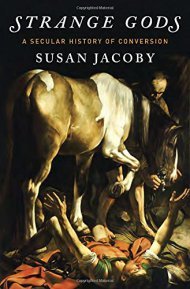 I stumbled across this blog post yesterday: When People Change Religions, Logic and Reason Aren’t Always in the Picture, inspired by Susan Jacoby’s new book, Strange Gods: a secular history of conversion. Jacoby writes:
I stumbled across this blog post yesterday: When People Change Religions, Logic and Reason Aren’t Always in the Picture, inspired by Susan Jacoby’s new book, Strange Gods: a secular history of conversion. Jacoby writes:
People generally think about conversion only in terms of a spiritual journey, when in fact, there are a lot of secular factors involved. Sometimes it is simply that the political winds have shifted. Another factor is discrimination against minorities. That was a huge factor in my father’s family because of anti-Semitism — people perceived being a Jew as a disadvantage. Also, the history of conversion is rife with people who adopt religion or another religion because they think it will help them overcome a personal failing or some compulsion like alcoholism, and in many cases, it does. But the most powerful secular factor promoting religious conversion is religious inter-marriage.
I’m not sure if I’ll read the book, but it sounds interesting, even though Jacoby’s conclusion doesn’t shock me at all. In fact, I recently learned that I’m not the first convert in my family. My great-great-great uncle (I think that’s the right number of “greats”) converted to Christianity around the turn of the 20th century, though it appears to be a business move over a spiritual conviction: Jewish businesses were considered less trustworthy, and a fresh-off-the-boat immigrant couldn’t risk falling into poverty. So there’s a bit of Caplin Trivia for you.
When I joined Campus Crusade for Christ in college, many students were excited at the evangelism prospects I offered: I could use the Old Testament to bring Jews to Jesus. It sounded like a sure plan, except…it wasn’t biblical prophecies that lead me to Jesus. I didn’t start reading the Bible with serious intent until after conversion (for the full conversion story, see my memoir. Or this post, Why I’m not a Messianic Jew). Oh, how disappointing this was for people to hear.
To this day, I’m still not interested in using biblical exegesis to “win” people over. I’m nowhere near knowledgeable enough to say with any degree of certainty or authority what the “proper” interpretations of the prophecies are. I’ve had much better luck explaining the real reasons: my fascination with saints and a personal god meeting us in human form, a radical Jesus who flipped social mores upside down, the promise of redemption from pain and tragedy.
That last point is especially important, because once I left my abusive relationship and started going to counseling for rape trauma, I gave serious consideration to ending my life. I thought my chances of having a healthy, normal relationship were ruined. I couldn’t stand the thought that my ex boyfriend would never see justice, that it could be my fault if he hurt someone else because I never reported him when I had the chance. So when I say the promise of redemption saved my life, I am not kidding.
Clearly, you can’t find a more emotional motive for conversion than that. I wish I could say, as Lee Strobel does in The Case for Christ, that I studied all the evidence and had no choice but to admit the truth. Nope. And even then, that “evidence” fails to convince many people.
I wish I knew more converts. I find conversion stories fascinating even if I don’t always agree with the motives behind them. If you’re someone who changed religions in adulthood, I’d be interested in featuring your story on this blog. Or feel free to share in the comment section.
A parting question for my religious followers: do you agree with Jacoby’s premise that emotion influences conversion more than “facts and reason”? Why or why not?
Filed under: Religion Tagged: Campus Crusade for Christ, Christian culture, Christianity, depression, evangelicals, grief, Judaism, rape culture








February 17, 2016
Comfort rather than answers
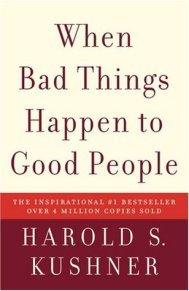 It’s been many years since I last read When Bad Things Happen to Good People by Rabbi Harold Kushner, and I think I’m due to read it again. The words will be the same, but my perspective as a reader this time around will be vastly different. Perhaps the worst thing I’d experienced when I last read this book was the crushing disappointment of liking a boy who didn’t like me back.
It’s been many years since I last read When Bad Things Happen to Good People by Rabbi Harold Kushner, and I think I’m due to read it again. The words will be the same, but my perspective as a reader this time around will be vastly different. Perhaps the worst thing I’d experienced when I last read this book was the crushing disappointment of liking a boy who didn’t like me back.
Interestingly, many of the 1 and 2-star reviews on Goodreads complain about Kushner’s portrayal of a God who seems to sit with us in suffering, but doesn’t promise to make it mean something. Few reviews (at least not the dozen or so I read, there are hundreds of them) complained about the issue of a good God allowing suffering, period. No, it seems many readers of this book were hoping to be assured that none of life’s pains and disappointments would be wasted or pointless. Then again, many reviewers identified as Christians, which explains a lot.
The Christian idea of redemption is what ultimately won me over. It doesn’t comfort me very much to think that God might be too weak or otherwise unable to stop my suffering, but it does comfort me to think that perhaps my suffering can be used for a greater purpose. In fact, that is precisely what the Christian God promises to do.
I can see how the Christian readers of this book were left feeling bereft at the end, because to them, Kushner is only telling half the story. Clearly, a book of this genre written by a rabbi is not going to end with the hope of resurrection and defeat of the cross.
But even then, there is suffering this side of heaven that feels pointless. I don’t expect Kushner or any theologian to come up with a convincing reason for that. Yet I pick up books like this one not to be convinced or promised of anything, but to be reminded that life after loss is possible. And Kushner, CS Lewis, and all great scholars of every religious stripe, are just as human as I am.
What books do you read for comfort rather than for answers?
Filed under: Religion Tagged: Christian culture, Christianity, grief, Judaism








February 15, 2016
Accidental Saints: a review
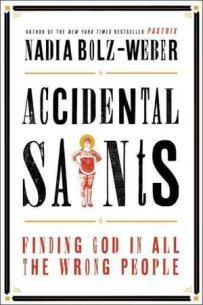 As I wrestle with doubt while gravitating toward the Anglican church, Nadia Bolz-Weber’s books seem like the perfect travel companions. Nadia herself seems like someone who would make a great mentor for my journey. And I’m not saying she’s not, but I didn’t LOVE Accidental Saints like I thought I would.
As I wrestle with doubt while gravitating toward the Anglican church, Nadia Bolz-Weber’s books seem like the perfect travel companions. Nadia herself seems like someone who would make a great mentor for my journey. And I’m not saying she’s not, but I didn’t LOVE Accidental Saints like I thought I would.
There are some great insights on the work of loving unlovable people and the messiness of faith, as well as thought-provoking stories, but they are just too short to have much impact. We don’t really get to know any of the people who influence Nadia’s faith, and her conclusions at the end of each vignette feel too hasty.
I do have a few things in common with Nadia. We’re both tattooed (she has way more ink than I do) and not against dropping f-bombs if a moment calls for one. The thing is, I try to save my bad words for heightened, dramatic situations to make strong points. The swearing on literally every other page was off-putting (“The fucking air conditioner took itself way too seriously and I was really fucking cold”) in a “Look at me, I’m so cool” kind of way. It seemed like she was trying to impress me with her not-like-them-ness, but after a few chapters I started wishing she would knock it off already.

She makes every effort to let the reader know that her church opens its doors to anyone, and truly anyone: drug dealers, prostitutes, all kinds of “unlikeables.” Hard to find fault with that. But there’s very little speculation about how such people challenge the notion of what Christians are “supposed” to look like. Nadia’s background is conservative, and the transition from fundamentalist theology to a more progressive one is skimmed over, if not glossed over completely, in both of her books. “God loves you as you are” is a great message, and it’s true that loving people can be challenging, but the spiritual conflict just didn’t feel very deep.
And yet, throughout the book are gems of wisdom like this one:
The sting of grace is not unlike the sting of being loved well, because when we are loved well, it is inextricably linked to all the times we have not been loved well, all the times we ourselves have not loved others well, and all the things we’ve done or not done that feel like evidence against our worthiness. Love and grace are such deceivingly soft words – but they both sting like hell and then go and change the shape of our hearts and make us into something we couldn’t create ourselves to be.
That’s a passage worth reading twice. Overall, I give this book 3 stars.
Filed under: Religion Tagged: censorship, Christian culture, Christianity, Controversy, evangelicals, Writing








February 11, 2016
Why I’m not a Messianic Jew
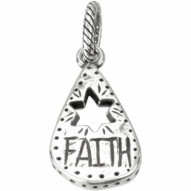 It’s a struggle for some people to believe that “Christian with Jewish heritage” and “Messianic Jew” are not the same thing. I completely understand why; it wasn’t that long ago that I myself would have failed to see the difference. My mind would be sounding off alarm bells trilling “Traitor! Traitor!” for me to even try and understand the difference. But as my acceptance as an interfaith person grows – that is, someone who still carries with her the markings of a Jewish culture into a different faith – an updated explanation is warranted.
It’s a struggle for some people to believe that “Christian with Jewish heritage” and “Messianic Jew” are not the same thing. I completely understand why; it wasn’t that long ago that I myself would have failed to see the difference. My mind would be sounding off alarm bells trilling “Traitor! Traitor!” for me to even try and understand the difference. But as my acceptance as an interfaith person grows – that is, someone who still carries with her the markings of a Jewish culture into a different faith – an updated explanation is warranted.
I don’t know too many people who converted from one faith to something totally different. I know people who converted from Catholicism to Protestantism, and vice versa, which is not to be understated, but is still within the larger umbrella of Christianity. People like me are pretty rare. I wish I could say I grew up this way, with one Christian parent and one Jewish one, so my allegiances were always split, but that is not the case. No, I was nineteen years old when I started calling myself a Christian, after years of quietly admiring Jesus and reading books about saints, wishing I could have the faith that they had. More details about the “why” of conversion can be read about in my memoir.
For a while, I did the best I could to shoehorn Jewish practice into my new Christian identity, except my Jewish life before Jesus was surface level at best. What being a “Jewish Christian” meant for me was going to church and continuing to observe Hanukkah and Passover. The larger, more complicated issues of theology were completely lost on me. Through my involvement with Campus Crusade for Christ, I was trained to view the Old Testament as nothing more than a precursor to the New. It was an incomplete story filled with clues that pointed to the coming of a Savior, and to chop it short just before the start of Matthew was akin to driving a car with only three tires. In other words, the Jews supposedly had all the pieces, but were still missing the final piece to make the vehicle run properly.
This was back in the day when being the center of attention mattered so much to me (I don’t know who that person is anymore), so being the “Jewish believer” was a role I didn’t mind playing. Over time, that changed. Friends in my bible study group would ask me for the “insider’s scoop” on how to evangelize to Jews. Little did they know I was not the ideal person to ask, since I wasn’t converted by any “Did you know it’s Jewish to believe in Jesus?” rhetoric.
Many American Jews are familiar with those tactics already, because they are written on pamphlets that get distributed on car windshields in synagogue parking lots, in mailboxes, and are posed by street preachers in Jewish garb – tallits, yarmulkes, tefillin, the whole nine yards – as strangers walk by. While it’s true that Jewish spiritual education is lacking as assimilation increases, Jews aren’t stupid. “Yeshua Ha’Moshiach” is still “Jesus the Messiah.”
There was something infantilizing about those questions I couldn’t put my finger on. My Christian friends seemed to pity the Jews for missing their own Messiah the way many of us can’t find the glasses that are sitting right on our noses, and I was “lucky” to realize the truth: to escape that world of lies. There’s a disdainful attitude all too common in churches that Jews don’t know anything about their own Scriptures, and must be taught it by Christians: “Goy-splaining,” for lack of a better term.
What many Christians don’t realize is that it simply isn’t enough to convince a Jewish person that Jesus is God. The theological teachings of Christianity and Judaism have evolved in opposite directions over the last 2,000 years. Original sin has never been a Jewish concept, and eternal punishment for lack of belief may be the least Jewish of them all (and if you’re curious, as many people are, I still have trouble swallowing this one). Christians are quick to point out that Jesus intended to “fulfill” the Jewish law, so the two religions are theologically compatible as one, but that’s not what happened. Jesus’ intent aside, we now have two distinctly different religions that share origins in Abraham, but that’s where the similarities end. It’s intellectually dishonest to claim otherwise, and those that do indirectly tell me that they don’t know as much about Judaism as they think they do.
Believe it or not, I study more Jewish theology now than I did pre-Jesus. My appreciation for it has deepened now that I study from a distance, but that distance isn’t as far as you might expect. The things that initially drove me away from Judaism are now the things I miss most about it; things I believe the church can benefit from. The lack of unity in Jewish belief used to bother me. You couldn’t look up a single explanation for “Jewish view of an afterlife,” for example, without stumbling on dozens of different answers. Christianity seemed more uniformed by comparison.
Of course, only after I became an insider did I see just now naïve it was of me to assume this. Whereas Christian tend to denounce differing viewpoints as heresy, Judaism has perfected the art of agreeing to disagree. I love the expression “two Jews, three opinions,” with an understanding that you can agree to disagree without losing your Jewish identity. I love the diversity in thought and the freedom to ask questions. I believe this, more than anything else, is the most “Jewish” part of my faith, and it gets me into trouble at times. Christians don’t have the best track record for handling doubts very well. My Jewish background is what enables me to change that.
I started using the expression “Jew-ish” to describe myself, first as a joke, but now somewhat more seriously. My family is not religious but is steeped in Jewish culture. My mom gets me Hanukkah socks every year. She also bought me a blue stocking that says “Happy Hanukkah” and a “Jewish penicillin” soup bowl. These are superficial totems of a Jewish identity, but they are markers of the sense of humor I’ve maintained because of my upbringing. I still feel a sense of camaraderie when I meet other Jews, and because of my decision to be honest about my journey upfront, I’ve been able to continue making Jewish friendships. This would not be possible if I identified as a Messianic Jew, because traditional Jews know that their messiah hasn’t come yet.
Filed under: Religion Tagged: Author Sarahbeth Caplin, Campus Crusade for Christ, Christian culture, Christianity, Confessions of a Prodigal Daughter, evangelicals, hell, Judaism, Messianic Judaism








February 10, 2016
Why I still don’t like Valentine’s Day
I’m a happily married woman now, but I’ve been single for far too long to suddenly change my feelings about Valentine’s Day. I actually didn’t see just how silly the whole thing is until after Josh and I started dating, but there’s a lesser-known reason I don’t care for Valentine’s Day. Now it’s funny, but at the time, it was devastating.
We started dating four years ago around Thanksgiving, celebrated our first Christmas, had my first New Year’s kiss (!), leaving Valentine’s Day as the last Hallmark holiday we had yet to experience as a couple. Josh isn’t a fan of Valentine’s Day either, but we decided to go out for dinner and treat it like a normal date night (with slightly dressier attire than usual).
I was looking forward to it until my skin started getting super dry (a typical occurrence for me in winter). No amount of Eucerin seemed to make it better. The dryness soon turned into a rash, which then turned scaly, and itched like crazy. When it wasn’t itching, it burned worse than infected chicken pox and poison ivy (and I’ve had both). I had no idea what it was, but it looked pretty ghastly, and I didn’t want to leave my house until it got better. My boss at the restaurant where I worked said “You don’t sound sick” when I called to let her know I wasn’t coming in, but when I showed up, her eyes bulged and she told me, “Yeah, you should probably stay home until whatever that is goes away.” At that point, I finally called a doctor.
You know your condition is awful when even the dermatologist, whom you’d assume has seen it all, gasps when you walk into her office. The biopsy results showed a highly contagious infection that had to be medicated right away, and would have turned serious if I’d waited any longer to come in. That alone was bad enough, but when the doctor said I’d have to be quarantined until it went away, meaning I’d have to cancel my Valentine’s date, that was when I burst into tears. My mom explained, “It’s her first Valentine’s date with her first serious boyfriend, that’s why she’s upset.” I was twenty-three. I felt so pathetic.
But that didn’t compare to the humiliation of having to call Josh and explain that not only did I have to cancel our plans, he also had to wash and disinfect anything my face might have touched within the last week: couch pillows, shirts, bathroom towels from when I stayed over…everything.
If he ended up getting what I had (which I would never wish on anyone, no matter how much I despised them) I wouldn’t have been shocked at all if that was it for us. He was studying to be a physician’s assistant, so he had seen his share of gross, but not this gross.
Against all common sense (I was contagious, after all), he showed up at my house with two canvasses and a set of paints. I wore a scarf around my face and he didn’t dare hug or kiss me, but we painted together at my kitchen table, which in a way was better than a fancy dinner because it was more personal, even though I felt miserable. He said he would stay with me even if my skin ended up permanently scarred like a survivor of smallpox, though I didn’t believe him. But with prescription drugs, my skin cleared up in about a week. Thank you, modern medicine!
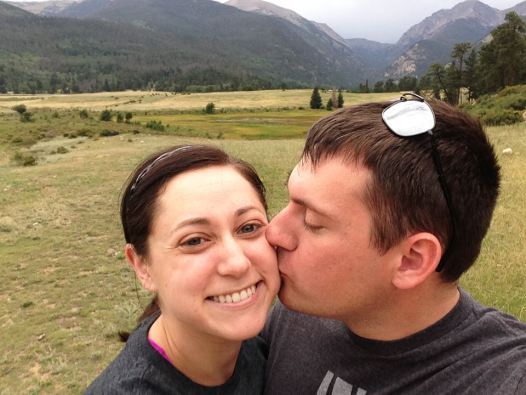
So even though that first Valentine’s Day was solid proof that I found a keeper, the very thought of the holiday still makes me feel a bit itchy.
Do you have bad Valentine’s stories? I challenge you to share one that’s worse!
Filed under: Other stuff Tagged: marriage, Valentine's Day








February 6, 2016
The pursuit of faith and reason
 It seems like most of my spiritual fuel comes from blog posts lately, and this comment on a post about Young Earth Creationism has stuck with me for the last several days:
It seems like most of my spiritual fuel comes from blog posts lately, and this comment on a post about Young Earth Creationism has stuck with me for the last several days:
You know, there comes a point in a story where you have to introduce so many Deus Ex Machina devices to close the gaping holes based on very basic knowledge of today (what we see animals eating; what their teeth look like, how big their territories/space need to be, problems with wooden boats-stuff you can observe without having specialized training) that one ought to take a step back and re-evaluate whether this story was meant to be literal. If there’s a ton of explaining about the story on a very basic level just in order to close up gaping holes of realism, maybe the story is more of a fantasy than a non-fiction.
It’s like traditional gender roles. If they’re so natural, why do people have to work so hard to force everyone to fit into those roles? If you constantly have to explain your 100% true story because there’s all these highly unrealistic plot holes, I think that tells you something. And yet, no matter how many times somebody asks a straightforward, basic question like “Wait, how did Noah manage to stop the lions and other carnivores from eating everybody?” people like Ken Ham never take a moment of introspection.
I never thought of Bible stories like that. I was a little late to Christian formation compared to most of my friends who got it in Sunday School, but when you’re brand new to the faith and possess the wet-behind-the-ears innocence of an impressionable believer, it doesn’t matter whether you’re 2 or 20 years old when you’re taught to believe everything in the Bible as 100% true and literal. I didn’t have a ton of knowledge about evolution, either (my public school was in a very conservative town, and functioned more like a private school in terms of permitted religious behaviors) so it never crossed my mind that genetic diversity today is actually too diverse to have originated from just two modern homosapiens.
It wasn’t until seminary that “real science” started to creep in around the fraying edges of inerrancy, when I encountered people who didn’t think environmental causes were that important because God would ultimately take care of his creation. Global warming, ocean life dying from oil spills, that was all propaganda from godless liberals bent on destroying Christianity. That was just one of my breaking points where I thought, What if we’re misinterpreting something here?
Better late than never, right?
The more intricate justifications I hear about how, precisely, Noah kept the carnivores from devouring the smaller animals on the ark, or how an entire population of humans came to be without committing the sin of incest, I fear we are drifting further and further away from the point of these stories. Far be it from me to explain what the “true” points are, but I don’t see how making creation all science-y is a productive use of time. We know that oral tradition was an important teaching tool in biblical times, and Jesus himself employed this method in his ministry by using parables. To me, arguing the specific unknowns of Old Testament science is as fruitless as debating whether the Good Samaritan was a real person. It’s not the point.
My background in literature and Judaic studies make it simpler for me to parse truths from meaningful, but perhaps factually un-true stories, which are all part of a Bigger Story (this is what I mean when I say I “do Christianity ‘Jewishly’”). I have fears of being completely wrong, but I also fear closing my mind to knowledge and reason. To paraphrase a friend of mine, the battle between intellectual honesty and the pursuit of religion might just be my greatest act of faith.
Filed under: Religion Tagged: Christian culture, Christianity, Controversy, creationism, evangelicals, Judaism, Ken Ham








February 4, 2016
The power of vulnerability
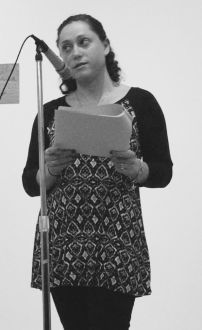 Vulnerability is not my favorite thing. Actually, it’s terrifying. But darn it if authentic experiences and feelings don’t make good books. The vulnerable memoirs are my favorite, so of course mine have to be. Doesn’t mean it gets easier. But it has been rewarding.
Vulnerability is not my favorite thing. Actually, it’s terrifying. But darn it if authentic experiences and feelings don’t make good books. The vulnerable memoirs are my favorite, so of course mine have to be. Doesn’t mean it gets easier. But it has been rewarding.
For a socially awkward introvert such as myself, it’s easier to pretend the crowds aren’t there. That doesn’t work as well when the audience cracks up at something I say that might be slightly funny. But I smile and press on.
I wouldn’t do this if I didn’t believe I had anything important to say. The thing is, the topics I write about – religious skepticism, feminism, rape – are unpopular for a reason. They are too commonly misunderstood, too “controversial,” and yes, too personal. Silence doesn’t have a good track record of making change happen, though. I want to see a world that is kinder to victims of violence, more understanding of people to whom faith does not come easily. I can’t do this any other way than by writing about it.
I applied for grad school with an understanding that I would not only learn how to be a better writer, but to pick at the threads of my work-in-progress memoir with a fine tooth comb. A classroom full of beta readers is the best thing I could ask for. Clearly, I’m in it more for the writing than for friendships, yet friendships are happening anyway, and I’m blown away. I’m horrible at accepting compliments, but am humbled just the same. The ability to publish and share my work is a privilege, but to have peers respond in a positive way is something else.
I’m not so concerned anymore about being the girl who always writes content that makes people a little uncomfortable. That’s not the avenue I dreamed of taking, but I sort of fell into it through a series of unexpected events, and that’s what it will be.
The following clip is from a live reading sponsored by students from the MFA program at Colorado State. My stubborn phone wouldn’t let me upload the entire thing. The full clip is available on my Facebook page (if you want to give the page a ‘like’ while you’re at it, I wouldn’t mind. Just sayin’).
Filed under: Feminism, Other stuff, Rape Culture, Religion, Writing & Publishing Tagged: Author Sarahbeth Caplin, cancer, censorship, Christian culture, Christianity, Confessions of a Prodigal Daughter, Controversy, depression, evangelicals, Feminism, grief, Indie Author Life, Judaism, rape culture, Writing








February 3, 2016
More lessons my father taught me
See also: Lessons my father taught me
I was going to post this on my father’s birthday, February 9th, but one of the biggest lies I’ve ever told myself as a writer is that I will remember my ideas without having to write them down. I was reminded of something funny my dad said when scrolling through newsfeed on Facebook, and then I thought…why not write a post of memorable Dad Quotes? (As best as I remember them, anyway)
Granted, there were many hilarious and occasionally poignant things he said over the 25 years that I knew him, but here are just a handful of recent ones. You will understand where my snark comes from:
After setting up his Facebook account and scrolling through his home page: “Why are all these people posting pictures of what they ate, and telling me what they did at every hour? Do they really think I care?” He turns to me: “I know you’re my kid, and therefore everything you do is unique and amazing, but I hope you don’t posts things like this. Because no one actually gives a shit.”
When caught dancing and singing in front of the stove cooking dinner, using the ladle as a microphone: “If you’re going to do something, why not be silly about it?”
On making the most of hardship: “I’m learning how to make fertilizer out of this shit.”
On giving compliments: “You’re the ribbit to my frog, Whipper Snipper.”
On parenting: “Sometimes you and your brother act like dumbasses, but you’re my dumbasses.”
On marriage: “I don’t care if you marry someone Jewish or not, just make sure whoever he is can lovingly poke fun at you with sarcasm.”
Happy (early) 60th, Papasaurus!
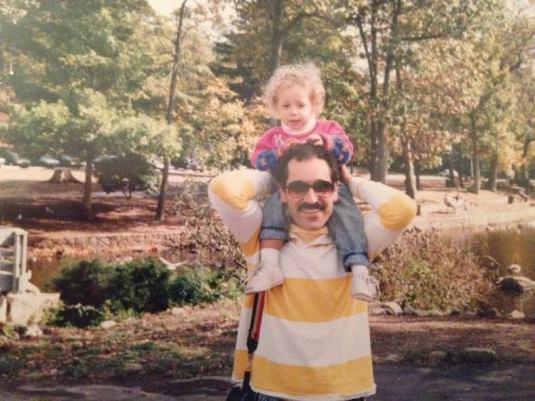
Filed under: Other stuff Tagged: cancer, grief











